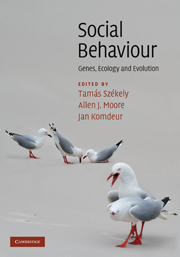Book contents
- Frontmatter
- Contents
- List of contributors
- Introduction: The uphill climb of sociobiology: towards a new synthesis
- Profile: Undiminished passion
- Part I Foundations
- Part II Themes
- 7 Aggression: towards an integration of gene, brain and behaviour
- Profile: From behavioural observations, to genes, to evolution
- 8 Social influences on communication signals: from honesty to exploitation
- Profile: Reputation can make the world go round – or why we are sometimes social
- 9 Important topics in group living
- Profile: A haphazard career
- 10 Sexual behaviour: conflict, cooperation and coevolution
- Profile: In celebration of questions, past, present and future
- 11 Pair bonds and parental behaviour
- Profile: Mating systems and genetic variation
- 12 Adaptations and constraints in the evolution of delayed dispersal: implications for cooperation
- Profile: Selections from a life in social selection
- 13 Social behaviour in microorganisms
- Profile: The de novo evolution of cooperation: an unlikely event
- 14 Social environments, social tactics and their fitness consequences in complex mammalian societies
- Profile: Evolutionary genetics and social behaviour: changed perspectives on sexual coevolution
- 15 Social behaviour in humans
- Profile: Genes and social behaviour: from gene to genome to 1000 genomes
- Part III Implications
- Species index
- Subject index
- References
Profile: A haphazard career
Published online by Cambridge University Press: 05 June 2012
- Frontmatter
- Contents
- List of contributors
- Introduction: The uphill climb of sociobiology: towards a new synthesis
- Profile: Undiminished passion
- Part I Foundations
- Part II Themes
- 7 Aggression: towards an integration of gene, brain and behaviour
- Profile: From behavioural observations, to genes, to evolution
- 8 Social influences on communication signals: from honesty to exploitation
- Profile: Reputation can make the world go round – or why we are sometimes social
- 9 Important topics in group living
- Profile: A haphazard career
- 10 Sexual behaviour: conflict, cooperation and coevolution
- Profile: In celebration of questions, past, present and future
- 11 Pair bonds and parental behaviour
- Profile: Mating systems and genetic variation
- 12 Adaptations and constraints in the evolution of delayed dispersal: implications for cooperation
- Profile: Selections from a life in social selection
- 13 Social behaviour in microorganisms
- Profile: The de novo evolution of cooperation: an unlikely event
- 14 Social environments, social tactics and their fitness consequences in complex mammalian societies
- Profile: Evolutionary genetics and social behaviour: changed perspectives on sexual coevolution
- 15 Social behaviour in humans
- Profile: Genes and social behaviour: from gene to genome to 1000 genomes
- Part III Implications
- Species index
- Subject index
- References
Summary
I was asked to explain why and how a Dutchman got to be a professor teaching animal behaviour in a French university. Someone must have thought that my story could provide some guidance for aspiring ethologists and behavioural ecologists. I am not so sure that my career path is one that should be followed, but perhaps someone can learn from my mistakes. I think I can now afford to write about them without much of a negative effect on my career. Not that I have bothered much about my ‘career’, but that is perhaps the core of my problem. I have never been good at preparing myself for the future, so after treading the mills of the Dutch educational system I found myself regularly confronted with steps in life that I should have prepared, if not better, then at least earlier. And so I ended up in a ‘cul de sac’. But let me start from the beginning.
I can't tell you what kind of ‘—ist’ I am exactly at this point – primatologist, behavioural ecologist or evolutionary psychologist – but I went to the university to become an ethologist. The reason was simple: I liked animals a lot, and notably the furry ones. I definitely preferred seeing them alive, healthy and doing their own thing. I understood from books by the likes of Tinbergen, Lorenz, Wickler and Eibl-Eibesfeldt that ethologists did professionally what I liked to do anyway: watch animals behave.
- Type
- Chapter
- Information
- Social BehaviourGenes, Ecology and Evolution, pp. 226 - 229Publisher: Cambridge University PressPrint publication year: 2010

